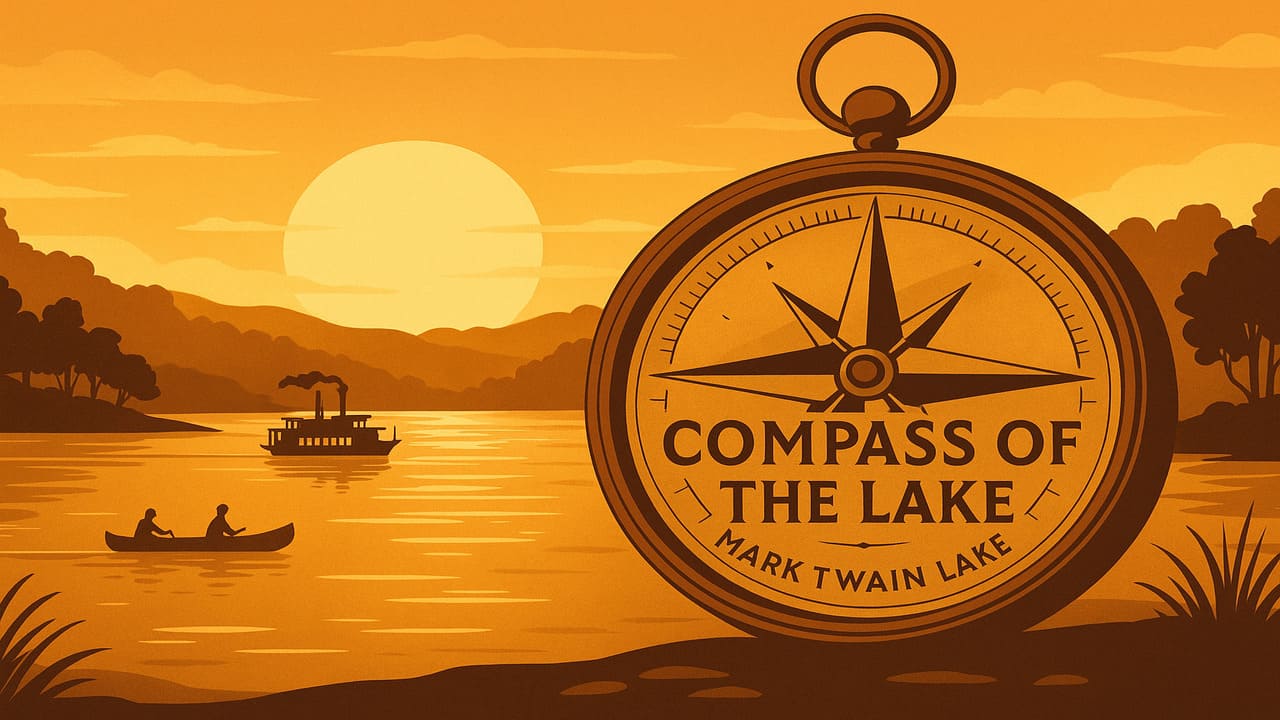
Visit MarkTwain Lake – Mark Twain Lake in Missouri carries with it not only natural beauty but also the literary spirit of one of America’s most celebrated authors. Samuel Clemens, better known as Mark Twain, found inspiration in the Mississippi River and its surrounding landscapes. His works, filled with adventures of Tom Sawyer and Huckleberry Finn, continue to shape how people view river life, exploration, and the search for direction. The phrase Compass of the Lake resonates perfectly with Twain’s legacy.
Just as a compass provides guidance through uncharted waters, Twain’s stories guide readers through the complexities of morality, freedom, and human connection. At Mark Twain Lake, this metaphor extends to visitors who come seeking not just recreation but also a deeper connection to history and heritage.
The compass as a symbol takes on special meaning when placed beside a lake. Unlike the vastness of oceans, lakes offer a sense of intimacy while still holding mystery. At Mark Twain Lake, a compass becomes more than a tool it represents the human desire to find direction in both physical and spiritual landscapes.
Visitors often stand by the shoreline, watching the sun reflect on the water, and feel a sense of orientation. The stillness of the lake allows people to pause and recalibrate, while the idea of a compass reminds them that even in moments of peace, direction and purpose remain essential. The lake becomes a mirror of self-discovery, and the compass becomes its emblem.
Also Read : River Echo Mugs: Ceramic Souvenirs with Boat Silhouettes and Lake Scenery
Mark Twain Lake is rich with stories that intertwine history, folklore, and personal memories. Local tales about fishing adventures, family camping trips, and cultural festivals all weave into the larger narrative of what makes the lake special. Every visitor adds a new chapter, and like points on a compass, these stories expand the dimensions of the lake’s identity.
The literary influence of Twain amplifies this storytelling tradition. His depictions of life along the Mississippi inspire visitors to view the lake not merely as a destination but as a canvas for imagination. The Compass of the Lake guides both residents and travelers to contribute their voices to this ongoing story, ensuring the heritage remains vibrant and inclusive.
Beyond its natural charm, Mark Twain Lake serves as a cultural hub for nearby communities. Festivals, art shows, and heritage events often draw on Twain’s legacy while highlighting local creativity. The compass metaphor works here too it symbolizes how communities orient themselves through shared traditions and collective memories.
For families, the lake becomes a gathering point where stories are passed down across generations. Grandparents recount fishing tales, parents share camping traditions, and children create their own adventures by the water. In this sense, the Compass of the Lake is not just about navigation but also about continuity, connecting the past, present, and future through shared cultural experiences.
The idea of the Compass of the Lake has also found expression in souvenirs and keepsakes. From keychains shaped like compasses to mugs and tote bags bearing the phrase, these items allow visitors to carry home not just a memory but a symbol of guidance and reflection. Such souvenirs are more than commercial products they embody the spirit of exploration and heritage tied to Mark Twain Lake.
For many travelers, owning a compass-inspired souvenir is a reminder of their journey, both literal and symbolic. It reflects time spent reconnecting with nature, learning about history, and sharing moments with loved ones. The Compass of the Lake thus becomes a tangible link between the individual and the broader story of the lake.
Read More : The Conjuring: Last Rites Flops Hard – Did the Warrens Just Ruin the Franchise?
Instead of ending with closure, it is important to consider the future of Compass of the Lake as part of Mark Twain Lake’s evolving identity. With the rise of sustainable tourism and heritage preservation, the concept can serve as a foundation for educational programs, artistic projects, and eco-friendly initiatives. Local businesses, schools, and cultural organizations could collaborate to expand the symbolism of the compass into workshops, exhibitions, and community storytelling events.
By integrating history, culture, and natural beauty, Mark Twain Lake can continue to position itself as more than a recreational site. It can become a beacon of heritage tourism, where the Compass of the Lake is not just a phrase but a living experience. As future generations visit and reinterpret its meaning, the compass will keep guiding people through stories, traditions, and the enduring legacy of Mark Twain himself.